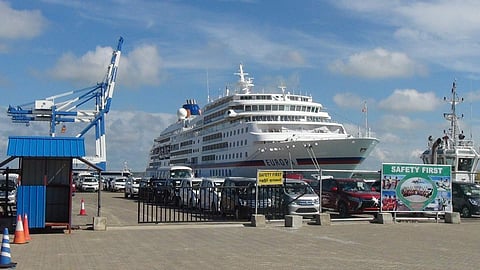

COLOMBO: Sri Lanka has asked a China-bound cargo ship to leave the strategic southern port of Hambantota after it was found to be carrying radioactive uranium without declaring it to authorities, officials said on Wednesday.
Anil Ranjith, the top official of the Sri Lanka Atomic Energy Authority (SLAEA), said that the ship was on its way to China from the port of Rotterdam in the Netherlands when it developed technical difficulties and entered the Hambantota Port.
The SLAEA said the vessel had failed to disclose its radioactive cargo when it docked in at the port.
Ranjith said it was a commercial vessel, which carried radioactive material - the particular material served as fuel for nuclear power plants.
The ship was managed by the China Merchants Port Holding Company.
Director of the Sri Lanka Atomic Energy Board, T.M.R Tennakoon said the port authorities were unaware of the material on board the ship when it entered the port.
Tennakoon said that when it was discovered that the ship contained radioactive materiel steps were taken to move the vessel to the outer-port.
He said that the ship was instructed not to unload any of the items on the vessel, the Daily Mirror newspaper reported.
Tennakoon also said that a team from the Atomic Energy Board has been dispatched to Hambantota immediately.
He said that there was no immediate threat to Sri Lanka from the hazardous items on board the ship and that the vessel.
Tennakoon also said that President Gotabaya Rajapaksa had been briefed about the incident, the report said.
The main Opposition leader Sajith Premadasa said in Parliament that the Sri Lanka Navy, which is in charge of the Hambantota port security, was not allowed to carry out inspections on the vessel.
Meanwhile, the Hambantota International Port Group (HIPG) said that M.V. BBC Naples sailing under the flag of Antigua & Barbados entered the port of Hambantota on 20th April at 2100 hrs, while en route from Rotterdam to China.
The ship made an emergency call at the port for some urgent repairs.
Agents for the vessel in Sri Lanka, Ms.Barwil Meridian Navigation, had not declared to the port authorities that there was dangerous cargo on board prior to the vessel entering the port, the HIPG said in a statement.
It was later found that they were carrying a cargo of Uranium Hexafluoride via investigations made by the Sri Lanka Navy and the Port Authority.
The vessel was required to leave the port no sooner the facts were verified, it said.
The Sri Lanka Ports Authority (SLPA), Navy, and Customs officials had approved all the necessary documentation prior to berthing of the vessel, based on the declaration made by the agent.
The Navy and Customs were present at all times to ensure that there wasn't any cargo unloaded onto the Hambantota International Port premises, it said.
The Sri Lankan government handed over the operations of the strategic port to the HIPG in 2017 on a 99-year lease.
The Hambantota International Port Group is a Public Private Partnership and a Strategic Development Project between the Government of Sri Lanka and China Merchants Port Holdings (CMPort).
Under the deal, a state-run Chinese company will have a 99-year lease on the port and about 15,000 acres nearby for an industrial zone.
Sri Lanka says the deal will help it to get out of the debt trap.
The country borrowed billions of dollars from China to build roads, ports and airports to revive the economy.
The controversial deal was delayed by several months over concerns that the port could be used by the Chinese military.
But Sri Lankan government has given assurances that China will run only commercial operations from the port, on the main shipping route between Asia and Europe.
The Hambantota port, overlooking the Indian Ocean, is expected to play a key role in China's ambitious "One Belt, One Road" initiative, which will link ports and roads between China and Europe.
China has pumped millions of dollars into Sri Lanka's infrastructure as part of the plan.